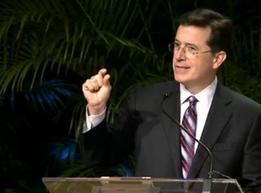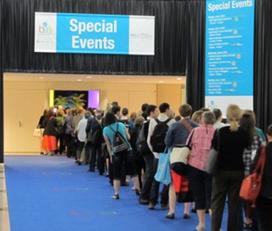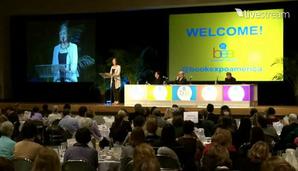
As master of ceremonies, Colbert introduced, as he put it, "three of the best authors of books other than mine": Junot Diaz (This Is How You Lose Her, Riverhead, September 11), Barbara Kingsolver (Flight Behavior, HarperCollins, November 6) and Jo Nesbo (Phantom, Knopf, October 2). Diaz expressed his astonishment at the seemingly endless line of booksellers that snaked away from the entrance to the special events hall before the event. "I saw you guys lining up at 7 a.m. and earlier," said Diaz. "You guys are amazing. You're like my heroes." Recalling his childhood as a self-described "book nerd," he added: "I always dreamed of lining up at 6:30 to do something with books." He also observed: "We are in a tremendous debt to you.... to booksellers, because of how absolutely important books are to the functioning of a democratic society.... In some ways you are the capillary strength of our democratic society."
Diaz expressed his astonishment at the seemingly endless line of booksellers that snaked away from the entrance to the special events hall before the event. "I saw you guys lining up at 7 a.m. and earlier," said Diaz. "You guys are amazing. You're like my heroes." Recalling his childhood as a self-described "book nerd," he added: "I always dreamed of lining up at 6:30 to do something with books." He also observed: "We are in a tremendous debt to you.... to booksellers, because of how absolutely important books are to the functioning of a democratic society.... In some ways you are the capillary strength of our democratic society."
That said, she insisted "the literary reader is a small but probably stable demographic," and emphasized the long human history of crafting stories, citing the importance of fiction in particular: "Nothing else out there puts you inside another human mind.... We writers and readers and sellers of fiction; this is the magical thing we do that cannot be replaced."
Storytelling was also on Nesbo's mind. "I grew up in a storytelling tradition." he said, adding: "Storytelling is a social reflex." He shared some of his family history, particularly his father's penchant for telling long stories at the dinner table while routinely enhancing the truth. Nesbo also recalled being assigned a school essay with the prompt of going into the woods. Even though he completed the assignment, for some reason the characters he created did not survive their forest visit. Thus, a brilliant career writing about grisly murders was hatched early. --Robert Gray

